Bill Cosby
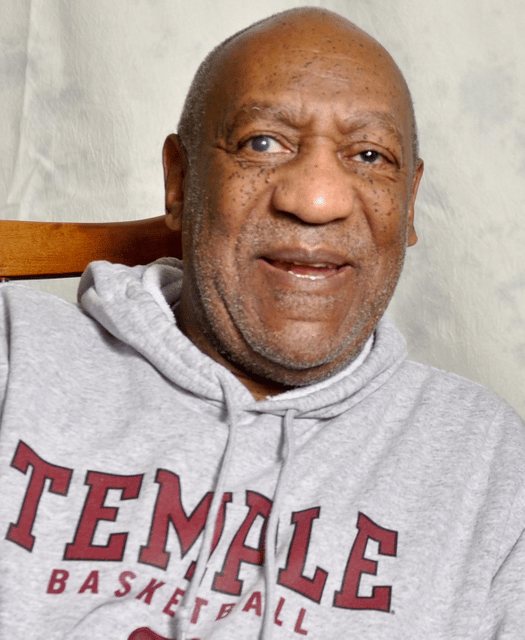
Bill Cosby

| Bill Cosby | |
|---|---|
| Birth name | William Henry Cosby Jr. |
| Born | (1937-07-12)July 12, 1937 Philadelphia, Pennsylvania, U.S. |
| Medium | Stand-up comedy, film, television |
| Alma mater | |
| Years active |
|
| Genres | Observational comedy, satire, surreal humor, deadpan |
| Spouse | Camille Hanks (m.1964) |
| Children | 5, including Erika Cosby and Ennis Cosby |
| Website | billcosby.com [154] |
| Criminal information | |
| Criminal status | Currently incarcerated at the State Correctional Institution – Phoenix; classified as sexually violent predator. |
| Conviction(s) | 3 counts of aggravated indecent assault |
| Criminal charge | 3 counts of aggravated indecent assault |
| Penalty | 3–10 years in state prison and a $25,000 fine. With an earliest release date of September 25, 2021. |
 | |
William Henry Cosby Jr. (/ˈkɒzbi/; born July 12, 1937) is an American stand-up comedian, actor, musician, author, and convicted sex offender. He held an active career for over six decades before being convicted and imprisoned for sex offenses in 2018.
Cosby began his career as a stand-up comic at the hungry i in San Francisco during the 1960s. He then landed a starring role in the television show I Spy, followed by his own sitcom The Bill Cosby Show, which ran for two seasons from 1969 to 1971. In 1972, using the Fat Albert character developed during his stand-up routines, Cosby created, produced, and hosted the animated comedy television series Fat Albert and the Cosby Kids which ran until 1985, centering on a group of young friends growing up in an urban area. Throughout the 1970s, Cosby starred in about a half-dozen films, and occasionally returned to film later in his career. In 1976, he earned his Doctor of Education from the University of Massachusetts Amherst. His dissertation discussed the use of Fat Albert and the Cosby Kids as a teaching tool in elementary schools.
Beginning in the 1980s, Cosby produced and starred in the television sitcom The Cosby Show, which aired from 1984 to 1992 and was rated as the number one show in America for 1985 through 1989. The sitcom highlighted the experiences and growth of an affluent African-American family. Cosby produced the spin-off sitcom A Different World, which aired from 1987 to 1993. He also starred in The Cosby Mysteries from 1994 to 1995 and in the sitcom Cosby from 1996 to 2000, and hosted Kids Say the Darndest Things from 1998 to 2000.
Cosby's reputation was tarnished during the mid-2010s by numerous women who made sexual assault accusations against him; the earliest accusations date back decades. More than 60 women have accused him of either attempted assault, rape, drug-facilitated sexual assault, sexual battery, child sexual abuse, and sexual misconduct, which he had denied, and the statute of limitations had by then expired in nearly all cases. Cosby was found guilty of three counts of aggravated indecent assault and sentenced to three to ten years in prison in September 2018.[2][3][4]
| Bill Cosby | |
|---|---|
| Birth name | William Henry Cosby Jr. |
| Born | (1937-07-12)July 12, 1937 Philadelphia, Pennsylvania, U.S. |
| Medium | Stand-up comedy, film, television |
| Alma mater | |
| Years active |
|
| Genres | Observational comedy, satire, surreal humor, deadpan |
| Spouse | Camille Hanks (m.1964) |
| Children | 5, including Erika Cosby and Ennis Cosby |
| Website | billcosby.com [154] |
| Criminal information | |
| Criminal status | Currently incarcerated at the State Correctional Institution – Phoenix; classified as sexually violent predator. |
| Conviction(s) | 3 counts of aggravated indecent assault |
| Criminal charge | 3 counts of aggravated indecent assault |
| Penalty | 3–10 years in state prison and a $25,000 fine. With an earliest release date of September 25, 2021. |
 | |
Early life
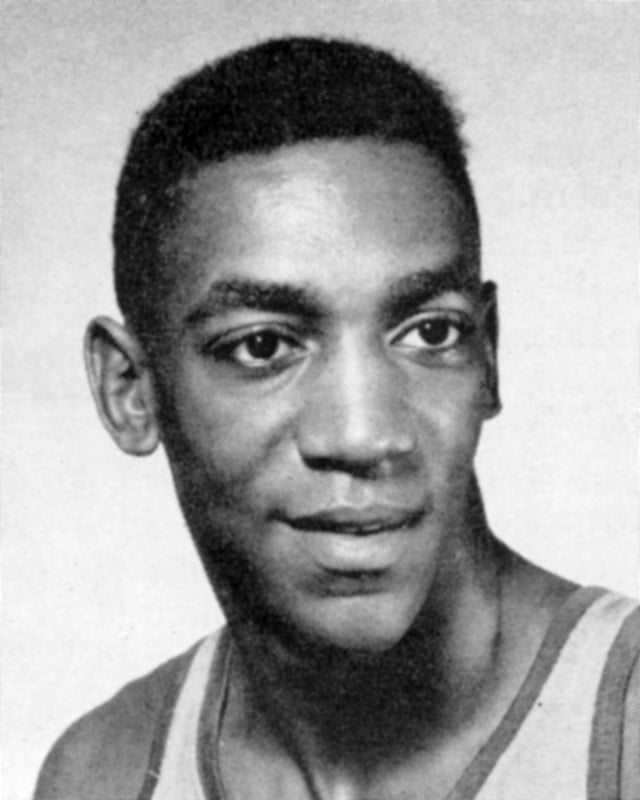
Cosby as a basketball player during his Navy service in 1957
Cosby was the class president as well as the captain of both the baseball and track and field teams at Mary Channing Wister Public School in Philadelphia.[8][9] Teachers noted that he had a propensity for joking around instead of studying, and he described himself as the class clown.[10] At FitzSimons Junior High School, Cosby acted in plays and continued to compete in sports. Cosby attended Philadelphia's Central High School, a magnet school and academically rigorous college prep school, where he ran track and played baseball, football, and basketball.[11] He transferred to Germantown High School but failed the tenth grade.[12]
In 1956,[13] Cosby enlisted in the Navy and served as a hospital corpsman at the Marine Corps Base Quantico in Virginia; at Naval Station Argentia in Newfoundland, Canada; and at the National Naval Medical Center in Maryland.[14] He worked in physical therapy with Navy and Marine Corps personnel who were injured during the Korean War.[14]
Cosby earned his high school equivalency diploma through correspondence courses[15] and was awarded a track and field scholarship to Temple University in 1961.[16] At Temple, he studied physical education while he ran track and played fullback on the college's football team.[17] He began bartending at a Philadelphia club, where he would earn bigger tips by making the customers laugh. He then took his talent to the stage.[18]
Stand-up career
Cosby left Temple to pursue a career in comedy. He lined up stand-up jobs at clubs in Philadelphia and then in New York City, where he appeared at The Gaslight Cafe beginning in 1961.[21] He booked dates in cities such as Chicago, Las Vegas, San Francisco, and Washington, D.C. In the summer of 1963, he received national exposure on NBC's The Tonight Show. This led to a recording contract with Warner Bros. Records, who, in 1964, released his debut LP Bill Cosby Is a Very Funny Fellow...Right!, the first of a series of comedy albums.[22] His album To Russell, My Brother, Whom I Slept With was number one on Spin magazine's list of "The 40 Greatest Comedy Albums of All Time", calling it "stand-up comedy's masterpiece".[23]
While many comics of the time were using the growing freedom of that decade to explore material that was controversial and sometimes risqué, Cosby was making his reputation with humorous recollections of his childhood. Many Americans wondered about the absence of race as a topic in Cosby's stories. As Cosby's success grew he had to defend his choice of material regularly; as he argued, "A white person listens to my act and he laughs and he thinks, 'Yeah, that's the way I see it too.' Okay. He's white. I'm Negro. And we both see things the same way. That must mean that we are alike. Right? So I figure this way I'm doing as much for good race relations as the next guy."[24]
In 1983, Cosby released the concert film Bill Cosby: Himself; it is widely regarded as "the greatest comedy concert film ever."[25] Younger, well-established comics like Jerry Seinfeld have credited Cosby as an innovator both as a practitioner of the genre of stand-up comedy, as well as a person who paved the way for comics to break into sitcom television. Seinfeld said of Cosby: "He opened a door for all of us, for all of the networks to even consider that this was a way to create a character, was to take someone who can hold an audience just by being up there and telling their story. He created that. He created the whole idea of taking a quote-unquote 'comic' and developing a TV show just from a persona that you see on stage."[26] Comedian Larry Wilmore also saw a connection between Bill Cosby: Himself and the later success of The Cosby Show, saying: "It's clear that the concert is the template for The Cosby Show."[26]
Cosby performed his first TV stand-up special in 30 years, Bill Cosby: Far from Finished, on Comedy Central on November 23, 2013.[27] His last show of the "Far from Finished" tour was performed at the Cobb Energy Performing Arts Centre in Atlanta, Georgia on May 2, 2015.[28] In 2014, Cosby was set to release his new standup special Bill Cosby 77 on Netflix.[29] The release of the film was canceled due to allegations of sexual assault against Cosby.[30]
His last known standup performance prior to his conviction was held at the LaRose Jazz Club in Philadelphia on January 23, 2018.[31]
Acting career
I Spy
In 1965, Cosby was cast alongside Robert Culp in the I Spy espionage adventure series on NBC. I Spy became the first weekly dramatic television series to feature an African-American in a starring role.[32] At first, Cosby and NBC executives were concerned that some affiliates might be unwilling to carry the series. At the beginning of the 1965 season, four stations declined the show; they were in Georgia, Florida, and Alabama.[33] Viewers were taken with the show's exotic locales and the authentic chemistry between the stars. It became one of the ratings hits of that television season. I Spy finished among the twenty most-watched shows that year, and Cosby would be honored with three consecutive Emmy Awards for Outstanding Lead Actor in a Drama Series.[34] When accepting his third Emmy for the show, Cosby told the audience: "Let the message be known to bigots and racists that they don't count!"[34]
During the series' run, Cosby continued to do stand-up comedy performances and recorded a half-dozen record albums for Warner Bros. Records. He also began to dabble in singing, recording Silver Throat: Bill Cosby Sings in 1967. In June 1968, Billboard magazine reported that Cosby had turned down a five-year, US$3.5 million contract renewal offer and would leave the label in August that year to record for his own record label.[35]
In July 1968, Cosby narrated Black History: Lost, Stolen, or Strayed, a CBS documentary addressing the representation of blacks in popular culture.[36] Andy Rooney wrote the Emmy-awarded script[37] for Cosby to read.[38] Georgetown University professor Michael Eric Dyson said it was one of "the rare exceptions when Cosby took off the gloves and blinders, to discuss race in public with candor and discernment."[39] Due to its popularity and controversial nature, it was rebroadcast less than a month later.[40]
Tetragrammaton Records, a division of the Campbell, Silver, Cosby (CSC) Corporation – the Los Angeles-based production company founded by Cosby, his manager Roy Silver, and filmmaker Bruce Post Campbell – produced films as well as records, including Cosby's television specials, the Fat Albert cartoon special and series, and several motion pictures. CSC hired Artie Mogull as President of the label. Tetragrammaton was fairly active during 1968–69 (its most successful signing was British heavy rock band Deep Purple) but it quickly went into the red and ceased trading during the 1970s.[41]
Fat Albert, The Bill Cosby Show, and the 1970s
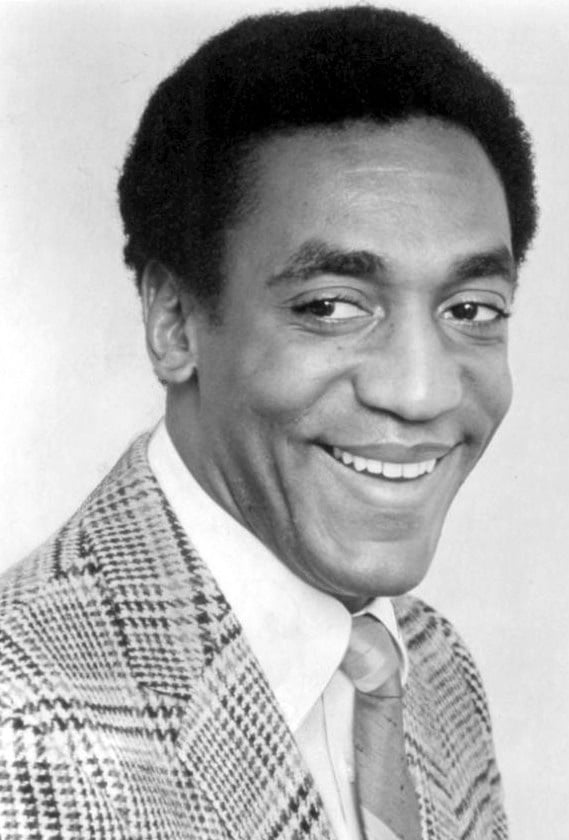
Cosby in 1969
Cosby pursued a variety of additional television projects and appeared as a regular guest host on The Tonight Show and as the star of an annual special for NBC. In 1969, he returned with another series, The Bill Cosby Show, a situation comedy that ran for two seasons. Cosby played a physical education teacher at a Los Angeles high school. While only a modest critical success, the show was a ratings hit, finishing eleventh in its first season. Cosby was lauded for using African-American performers such as Lillian Randolph, Moms Mabley, and Rex Ingram as characters. According to commentary on the Season 1 DVDs for the show, Cosby was at odds with NBC over his refusal to include a laugh track in the show, as he felt that viewers had the ability to find humor for themselves when watching a TV show.
After The Bill Cosby Show left the air, Cosby resumed his formal education. He began graduate work at the University of Massachusetts Amherst. For the PBS series The Electric Company, Cosby recorded several segments teaching reading skills to young children.
When Cosby was about 35 years old in 1972, he received an MA from UMass Amherst and was also back in prime time with a variety series, The New Bill Cosby Show. However, this show lasted only a season. More successful was a Saturday-morning cartoon, Fat Albert and the Cosby Kids, hosted by Cosby and based on his own childhood. That series ran from 1972 to 1979, and as The New Fat Albert Show in 1979, and The Adventures of Fat Albert and the Cosby Kids. In 1984, Cosby wrote the dissertation: "An Integration of the Visual Media Via 'Fat Albert And The Cosby Kids' into the Elementary School Curriculum as a Teaching Aid and Vehicle to Achieve Increased Learning". This was as partial fulfillment for his 1976 doctorate in education from UMass.[21][42] Subsequently, Temple University would grant him his bachelor's degree on the basis of "life experience."[43]
During the 1970s, Cosby and other African-American actors, including Sidney Poitier, joined forces to make some successful comedy films to counter the violent "blaxploitation" films of the era, such as Uptown Saturday Night in 1974; Let's Do It Again in 1975; and in 1976, Mother, Jugs & Speed, co-starring Raquel Welch and Harvey Keitel. About this last film, a Rotten Tomatoes reviewer wrote, "Bill Cosby steals the film outright with his hilarious performance as 'Mother', the streetwise seen-it-all EMT."
In 1976, Cosby starred in A Piece of the Action with Poitier; and California Suite, a compilation of four Neil Simon plays. He also hosted Cos in 1976. In addition, he produced an hour-long variety show featuring puppets, sketches, and musical numbers. It was during this season that ABC decided to take advantage of this phase of Cosby's career, by joining with Filmation producers of Fat Albert to create live-action segments starring Cosby, for the 1964/1971 animated film Journey Back to Oz; it subsequently aired in syndication. Cosby was also a regular on children's public television programs starting in the 1970s, hosting the "Picture Pages" segments that lasted into the early 1980s.
The Cosby Show and the 1980s
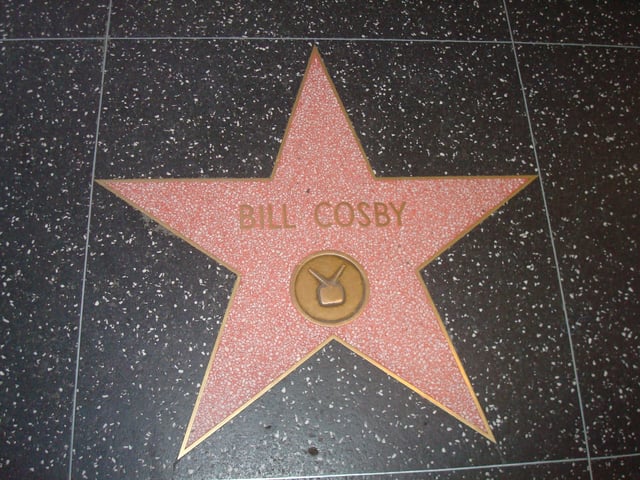
Star on the Hollywood Walk of Fame awarded in 1977[44]
Cosby's greatest television success came in September 1984 with the debut of The Cosby Show. Cosby, an advocate for family-oriented humor, co-produced the series, held creative control, and involved himself in every aspect of production. Plots were often based on ideas that Cosby suggested while in meetings with the writing staff.[45] The show had parallels to Cosby's actual family life: like the characters Cliff and Clair Huxtable, Cosby and his wife Camille were college educated and financially successful, and they had five children. On the show, Cosby played the role of an obstetrician. Much of the material from the pilot and first season of The Cosby Show was taken from his video Bill Cosby: Himself, released in 1983. The series was an immediate success, debuting near the top of the ratings and staying there for most of its eight-season run.
In 1987, Cosby attempted to return to film with the spy spoof Leonard Part 6. Although Cosby himself was the producer and wrote the story, he realized during production that the film was not going to be what he wanted and publicly denounced it, warning audiences to stay away.[46] Later in the 1980s, Cosby served as an advisor to the Los Angeles Student Film Institute.[47][48]
1990s and 2000s
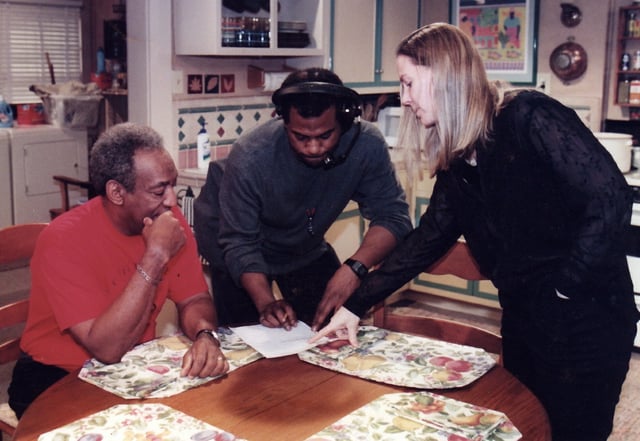
Cosby, a production assistant, and Ginna Marston of Partnership for Drug-Free Kids review the script for a 1990 public service spot at Cosby's studio in Astoria, Queens.
After The Cosby Show went off the air in 1992, Cosby embarked on a number of other projects, which included a revival of the classic Groucho Marx game show You Bet Your Life (1992–93), the TV-movie I Spy Returns (1994), and The Cosby Mysteries (1994). In the mid-1990s, he appeared as a detective in black-and-white film noir-themed commercials for Turner Classic Movies. He made appearances in three more films: Ghost Dad (1990), The Meteor Man (1993), and Jack (1996). In addition, he was interviewed in Spike Lee's 4 Little Girls (1997), a documentary about the 1963 racist bombing of a church in Birmingham, Alabama.
Also in 1996, he started up a new show for CBS, Cosby, again co-starring Phylicia Rashād, his onscreen wife on The Cosby Show. Cosby co-produced the show for Carsey-Werner Productions. It centered on Cosby as Hilton Lucas, an iconoclastic senior citizen who tries to find a new job after being downsized and, in the meantime, gets on his wife's nerves. Madeline Kahn co-starred as Rashād's goofy business partner Pauline. Cosby was hired by CBS to be the official spokesman of its Detroit affiliate WWJ-TV during an advertising campaign from 1995 to 1998. Cosby also hosted a CBS special, Kids Say the Darndest Things on February 6, 1995, which was followed after as a full season show, with Cosby as host, from January 9, 1998, to June 23, 2000.[49] After four seasons, Cosby was canceled. Its last episode aired April 28, 2000. Kids Say the Darndest Things was terminated the same year.
A series for preschoolers, Little Bill, created by Cosby as a semi-biographical representation of his childhood growing up in Philadelphia, made its debut on Nickelodeon in 1999. The network renewed the popular program in November 2000. In 2001, Cosby's agenda included the publication of a new book, as well as delivering the commencement addresses at Morris Brown College,[50] Ohio State University,[51] and at Rensselaer Polytechnic Institute.[52] Also that year, he signed a deal with 20th Century Fox to develop a live-action feature film centering on the popular Fat Albert character from his 1970s cartoon series. Fat Albert was released in theaters in December 2004. In May 2007, Cosby spoke at the commencement of High Point University.[53] In the summer of 2009, Cosby hosted a comedy gala at Montreal's Just for Laughs, the largest comedy festival in the world.[54]
2010s
A new NBC show scheduled for 2015, created by Mike O'Malley and Mike Sikowitz and to have been produced by *The Cosby Show'*s Tom Werner, was set to feature Cosby as Jonathan Franklin, the patriarch of a multi-generational family.[55] On November 19, 2014, NBC scrapped Cosby's new show after accusations resurfaced that he sexually assaulted and raped women.[56]
Reruns of The Cosby Show were canceled as a result of Cosby's sexual assault allegations. On November 19, 2014, NBC and TV Land both ended their relationships with Cosby; TV Land announced that it was pulling reruns from its schedule and also removing clips of the show from its website.[57][58] In December 2014, the Magic Johnson-owned Aspire removed the series from its lineup.[59] In July 2015, broadcast network Bounce TV pulled reruns, and BET's Centric (another Viacom unit) stopped airing reruns.[60] In late 2014, Creative Artists Agency, Cosby's agency since 2012, dropped him as a client.[61]
Music career
On June 25, 2019, The New York Times Magazine listed Bill Cosby among hundreds of artists whose material was reportedly destroyed in the 2008 Universal fire.[62]
Sexual assault accusations, trials, guilty verdict and incarceration
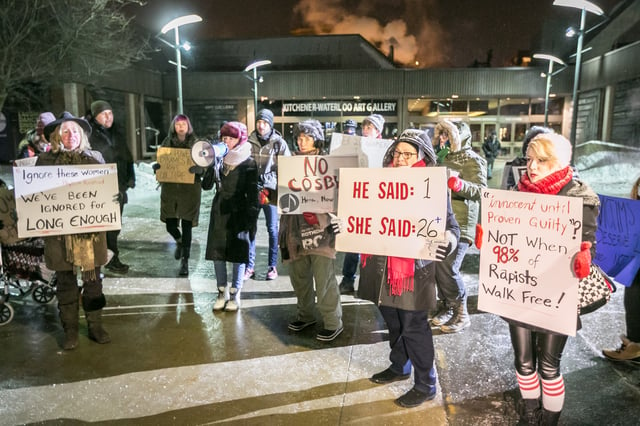
Demonstrators protesting against Bill Cosby in Kitchener, Ontario, Canada
Cosby has been the subject of highly publicized accusations of rape, drug-facilitated sexual assault, sexual battery, child sexual abuse, and sexual misconduct, the earliest of which were said by his accusers to have taken place in the mid-1960s. In October 2014, a part of comedian Hannibal Buress's comedy routine that described sexual misbehavior by Cosby went viral, resulting in more women coming forward to state that they were assaulted by Cosby. The dates of the alleged incidents span from 1965 to 2008 across ten U.S. states and one Canadian province.[63][64][65]
Cosby has repeatedly denied the allegations and maintained his innocence. In November 2014, he responded to a question about the allegations and said: "I don't talk about it."[66] In past interviews that were made public, Cosby declined to discuss the accusations.[67] However, he told Florida Today, "People shouldn't have to go through that and shouldn't answer to innuendos."[67] In May 2015 he said, "I have been in this business 52 years and I've never seen anything like this. Reality is a situation and I can't speak."[68]
In the wake of the allegations, numerous organizations have severed ties with Cosby, and honors and titles that were previously awarded to him have been revoked. Reruns of The Cosby Show and other shows featuring Cosby have also been pulled from syndication by many organizations. 25 colleges and universities have rescinded honorary degrees.[69] In an attempt to explain the backlash against Cosby, Adweek reporter Jason Lynch noted that the "media landscape has changed considerably—and has now been joined by the far-less-forgiving social media arena."[70]
Most of the acts fall outside of the statutes of limitations for criminal prosecution, but criminal charges were filed against Cosby in one case and numerous civil lawsuits have been brought against him. As of November 2015, eight related civil suits were active against Cosby.[71][72] High-profile attorney Gloria Allred is representing 33 of the alleged victims. In July 2015, some of the court records from Andrea Constand's 2005 civil suit against Cosby were unsealed and released to the public. The full transcript of his deposition was also released to the media by a court reporting service. In his testimony, Cosby admitted to casual sex, involving the recreational use of the sedative methaqualone (Quaaludes), with a series of young women, and acknowledged that his dispensing the prescription drug was illegal.[73][74][75]
Based on incidents in January 2004, Cosby was found guilty on April 26, 2018, of three counts of aggravated indecent assault against a Toronto woman, after a jury trial.[76][77] On September 25, 2018, he was sentenced to three to ten years in state prison and a $25,000 fine plus court costs of both trials.[2][3][4] After a brief period in the Montgomery County Correctional Facility, Cosby was moved to a state prison, SCI Phoenix in Skippack Township, Pennsylvania, on September 25, 2018, where he was confined to a single cell.[78][79] On January 28, 2019, Cosby was moved from administrative segregation into the general population.[80]
Defamation lawsuit settlement
In early April 2019, Cosby's home insurance company (AIG) settled a federal defamation lawsuit with seven women accused of lying by Cosby when they accused Cosby of sexual assault, but could no longer bring criminal charges because their allegations were too old. The suit was filed in December 2014, and the settlement terms were not disclosed. The seven women's accusations span decades, from 1969 until 1992. The seven are a subset of as many as 50 women who have spoken out accusing Cosby of sexual harassment and/or assault.[81] A spokesman for Mr. Cosby, Andrew Wyatt, stated that Cosby did not settle the case; rather, his insurance company American International Group settled without the "knowledge, permission, and/or consent of Mr. Cosby. Mr. Cosby vehemently denies the allegations brought against him in these defamation suits, and he maintains his innocence,"[82] There are currently three other cases active against Mr. Cosby around the country; one is another defamation case, and the other two are lawsuits directly related to their claims of sexual assault.[82]
Political views
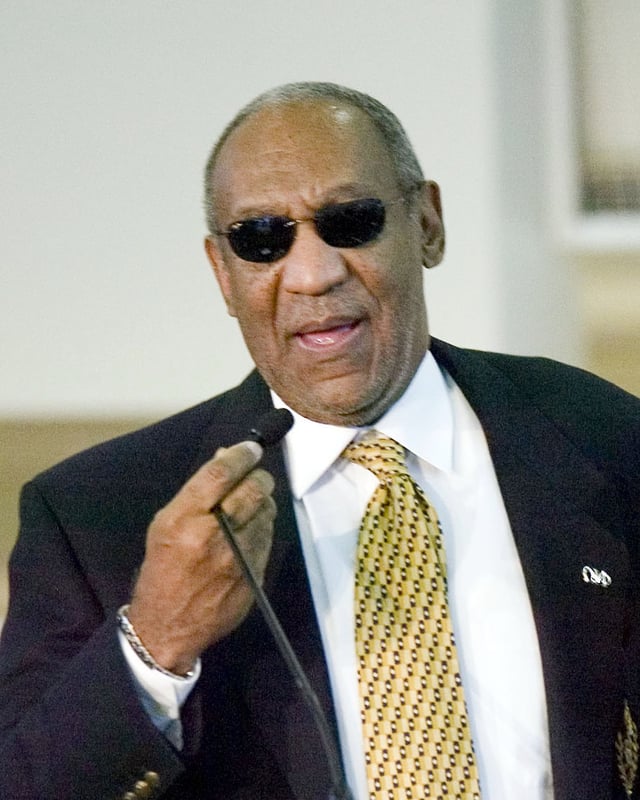
Cosby at Frederick Douglass High School in Atlanta, Georgia, in 2006
Cosby received an award at the celebration of the 50th anniversary commemoration of Brown v. Board of Education ruling—a ruling of the U.S. Supreme Court that outlawed racial segregation in public schools. Later, in May 2004, he made public remarks that were critical of African-Americans who put higher priorities on sports, fashion, and "acting hard" than on education, self-respect, and self-improvement. He pleaded for African-American families to educate their children on the many different aspects of American culture.[83][84] In the Pound Cake speech, Cosby asked that African-American parents teach their children better morals at a younger age. As reported in The Washington Times, Cosby "told reporters during a special session of the Congressional Black Caucus Foundation's 34th annual legislative conference" that, "Parenting needs to come to the forefront. If you need help and you don't know how to parent, we want to be able to reach out and touch you."[85] Richard Leiby of The Washington Post reported, "Bill Cosby was anything but politically correct in his remarks Monday night at a Constitution Hall bash commemorating the 50th anniversary of the Brown v. Board of Education decision."[86]
Cosby again came under sharp criticism, and was largely unapologetic for, his stance when he made similar remarks during a speech at a July 1 meeting of the Rainbow-Push Coalition that commemorated the anniversary of Brown v. Board, where he said "... you've got to stop beating up your women because you can't find a job, because you didn't want to get an education and now you're [earning] minimum wage."[87][88] During that speech, he admonished apathetic blacks for not assisting or concerning themselves with the individuals who are involved with crime or have counterproductive aspirations. He further described those who needed attention as blacks who "had forgotten the sacrifices of those in the Civil Rights Movement."[89]
In 2005, Georgetown University sociology professor Michael Dyson wrote a book, Is Bill Cosby Right? Or Has the Black Middle Class Lost Its Mind?[90] In the book, Dyson wrote that Cosby was overlooking larger social factors that reinforce poverty and associated crime; factors such as deteriorating schools, stagnating wages, dramatic shifts in the economy, offshoring and downsizing, chronic underemployment, and job and capital flight.[91] Dyson suggested that Cosby's comments "betray classist, elitist viewpoints rooted in generational warfare."[90] However, Cornel West defended Cosby and his remarks, saying, "He's speaking out of great compassion and trying to get folk to get on the right track, 'cause we've got some brothers and sisters who are not doing the right things, just like in times in our own lives, we don't do the right thing... He is trying to speak honestly and freely and lovingly, and I think that's a very positive thing."[92]
In a 2008 interview, Cosby mentioned Philadelphia; Atlanta; Chicago; Detroit; Oakland, California; and Springfield, Massachusetts among the cities where crime was high and young African-American men were being murdered and jailed in disproportionate numbers. Cosby stood his ground against criticism and affirmed that African-American parents were continuing to fail to inculcate proper standards of moral behavior.[93]
Cosby's vocal social comments led to the unsealing of documents in a previous civil suit by a woman who had accused Cosby of sexual assault, which in turn sparked renewed interest in older allegations. The judge ruled that releasing the sealed documents was justified by the "stark contrast between Bill Cosby, the public moralist and Bill Cosby, the subject of serious allegations concerning improper (and perhaps criminal) conduct."[94]
Cosby has also been vocally critical of conservative Republican politicians in regard to their views on socioeconomic and racial issues. In a 2013 CNN interview regarding voting rights, Cosby stated "this Republican Party is not the Republican Party of 1863, of Abraham Lincoln, abolitionists and slavery, is not good. I think it's important for us to look at the underlying part of it. What is the value of it? Is it that some people are angry because my people no longer want to work for free?"[95]
Personal life
Cosby married Camille Hanks on January 25, 1964. Together, they had five children, Erika (b. 1965), Erinn (b. 1966), Ennis (1969–1997), Ensa (1973–2018), and Evin (b. 1976). Their only son, Ennis, was murdered on January 16, 1997, while changing a flat tire on the side of Interstate 405 in Los Angeles.[96] Cosby's daughter Ensa died of renal disease on February 23, 2018, while awaiting a kidney transplant.[97] The Cosbys have three grandchildren.[6][98] Cosby, a Protestant,[99] maintains homes in Shelburne, Massachusetts, and Cheltenham, Pennsylvania.[100]
Cosby hosted the Los Angeles Playboy Jazz Festival from 1979 to 2012 (George Lopez has hosted the event since then). Known as a jazz drummer, he can also be seen playing bass guitar with Jerry Lewis and Sammy Davis Jr. on Hugh Hefner's 1970s talk show. His story, "The Regular Way", was featured in Playboy's December 1968 issue.[101] Cosby has become an active member of The Jazz Foundation of America.[102] Cosby became involved with the foundation in 2004. For several years, he has been a featured host for its annual benefit, A Great Night in Harlem, at the Apollo Theater in New York City.[103][104]
Cosby and his wife have collected over 300 works of African-American art since 1967. The works went on display in "Conversations", an exhibit at the National Museum of African Art in 2014.[105] The show became controversial as the increasing number of sexual assault allegations against Cosby became prominent.[106]
Cosby is a supporter of his alma mater, Temple University, particularly its men's basketball team, whose games Cosby frequently attended prior to his arrest. He is also a member of the Omega Psi Phi fraternity; he was initiated in the fraternity's Beta Alpha Alpha graduate chapter in White Plains, New York, in 1988.[107]
In 2016, Cosby's attorneys reported that he is now legally blind.[108] In an April 2017 interview with the National Newspaper Publishers Association (an interview he agreed to do on the condition that the NNPA portrayed him in a positive light), both Cosby and one of his former publicists confirmed this, noting he lost his sight at some point in 2015.[109][110]
Autumn Jackson extortion trial
During Autumn Jackson's extortion trial in July 1997, Cosby testified that he made private payments to Shawn Upshaw, a woman who had briefly been his lover in Las Vegas during the early 1970s. Upshaw later told Cosby that he was the father of her daughter, Autumn Jackson. Cosby denies being the father and said that he gave Upshaw a total of about $100,000 because he did not want her to publicly reveal the affair.[111] The then-22-year-old Jackson was sentenced to 26 months in jail for trying to extort US$40 million from Cosby. In the trial and subsequent appeal, the courts held that Jackson's belief that she was Cosby's child—even if sincere—was irrelevant to the question of her guilt. The courts stated that the mere fact that she was Cosby's child would not have entitled her to the $40 million she demanded, and therefore the demand was extortionate, whether or not she believed herself to be Cosby's daughter.[112] Although both Jackson and Cosby stated at various times that they were willing to undergo DNA testing to determine Jackson's paternity, the two sides never reached an agreement as to when and how to perform the test. After Jackson's conviction, Cosby provided a blood sample for testing, but Jackson refused to participate.[113][114]
Awards and honors
2002: Received the Presidential Medal of Freedom from George W. Bush
2002: The scholar Molefi Kete Asante included Cosby in his book The 100 Greatest African Americans.[115]
2005: In a British poll broadcast on Channel 4 to find the Comedian's Comedian, he was voted among the top-50 comedy acts ever by fellow comedians and comedy insiders.[116]
2010: Received the Lone Sailor Award by the United States Navy Memorial.[117]
2010: Received the National Football Foundation's Gold Medal[118]
Golden Globes
Golden Globe Award for Best Actor – Television Series Musical or Comedy – Golden Globe Award 1984 The Cosby Show – Cliff Huxtable 1985 The Cosby Show – Cliff Huxtable
Emmys
Outstanding Continued Performance by an Actor in a Leading Role in a Dramatic Series – Primetime Emmys 1966 I Spy – Alexander Scott 1967 I Spy – Alexander Scott 1968 I Spy – Alexander Scott
Outstanding Variety or Musical Program – Primetime Emmys 1969 The Bill Cosby Special
Grammys
Best Comedy Performance – Grammy Awards 1965 I Started Out as a Child 1966 Why Is There Air? 1967 Wonderfulness 1968 Revenge 1969 To Russell, My Brother, Whom I Slept With 1970 Sports 1987 Those of You with or Without Children, You'll Understand
Best Recording for Children – Grammy Awards 1971 The Electric Company – Cast member 1972 Bill Cosby Talks to Kids About Drugs
Honorary degrees
Cosby was awarded around 70 honorary degrees and many other honors since 1985. Most of these were revoked after he was accused of sexual offenses or after his conviction for sexual assault.[119]
Rescinded awards
Rescinded awards due to convictions and allegations of sexual assault:
2011: Received Honorary Chief Petty Officer from US Navy. Revoked December 4, 2014.[120]
2009: Received the Marian Anderson Award. Rescinded May 3, 2018.[121]
1998: Received the Kennedy Center Honor.[122] Rescinded May 7, 2018.[123]
2009: Presented with the 12th annual Mark Twain Prize for American Humor.[124][125] Rescinded May 7, 2018.[123]
2002: Received the TCA Career Achievement Award. Rescinded September 25, 2018.[126]
Works
Discography
Comedy albums
Bill Cosby Is a Very Funny Fellow...Right! (1963)
I Started Out as a Child (1964)
Why Is There Air? (1965)
Wonderfulness (1966)
Revenge (1967)
To Russell, My Brother, Whom I Slept With (1968)
200 M.P.H. (1968)
8:15 12:15 (1969)
It's True! It's True! (1969)
Sports (1969)
Live: Madison Square Garden Center (1970)
When I Was a Kid (1971)
For Adults Only (1971)
Bill Cosby Talks to Kids About Drugs (1971)
Inside the Mind of Bill Cosby (1972)
Fat Albert (1973)
My Father Confused Me... What Must I Do? What Must I Do? (1977)
Bill's Best Friend (1978)
Bill Cosby: Himself (1982)
Those of You with or Without Children, You'll Understand (1986)
Oh, Baby! (1991)
Far from Finished (TV broadcast on November 23, 2013, Blu-ray, DVD, CD, and digital distribution on November 26, 2013)[127]
Music albums
Silver Throat: Bill Cosby Sings (1967)
Bill Cosby Sings Hooray for the Salvation Army Band! (1968)
Badfoot Brown & the Bunions Bradford Funeral & Marching Band (1971)
Charles Mingus and Friends in Concert – As master of ceremonies (Columbia, 1972)
Bill Cosby Presents Badfoot Brown & the Bunions Bradford Funeral Marching Band (1972)
At Last Bill Cosby Really Sings (1974)
Bill Cosby Is Not Himself These Days (1976)
Disco Bill (1977)
Where You Lay Your Head (1990)
My Appreciation (1991)
Hello Friend: To Ennis, With Love (1997)
Quincy Jones & Bill Cosby – The Original Jam Sessions 1969 (2004)
Quincy Jones & Bill Cosby – The New Mixes Vol. 1 (2004)
State of Emergency (2009)
Keep Standing (2010)
Compilations
The Best of Bill Cosby (1969)
More of the Best of Bill Cosby (1970)
Bill (1973)
Down Under (1975)
Cosby and the Kids (1986)
At His Best (1994)
20th Century Masters: The Millennium Collection: The Best of Bill Cosby (2001)
The Bill Cosby Collection (2004)
Icon (2011)
Singles
| Year | Single | Chart Positions | |
|---|---|---|---|
| US | US R&B | ||
| 1967 | "Little Ol' Man (Uptight—Everything's Alright)" | 4 | 18 |
| 1970 | "Grover Henson Feels Forgotten" | 70 | — |
| 1976 | "I Luv Myself Better Than I Luv Myself" | — | 59 |
| "Yes, Yes, Yes" | 46 | 11 | |
Filmography
Television
| Year | Title | Role | Notes |
|---|---|---|---|
| 1965–1968 | I Spy | Alexander Scott | Main role (82 episodes) |
| 1969 | Hey, Hey, Hey, It's Fat Albert | Bill / Fat Albert / Dumb Donald (voice) | Movie; also writer |
| 1969–1971 | The Bill Cosby Show | Chet Kincaid | Lead role (52 episodes); also executive producer |
| 1971 | Man and Boy | Caleb Revers | Movie |
| 1971–1973 | The Electric Company | Hank | 260 episodes |
| 1972 | The New Bill Cosby Show | Himself/host | |
| 1972–1985 | Fat Albert and the Cosby Kids | "Fat" Albert Jackson (voice) / Himself/host | Main role (34 episodes); also the creator |
| 1972 | To All My Friends on Shore | Blue | Movie |
| 1974 | Journey Back to Oz | The Wizard of Oz | TV version |
| 1976 | Cos | Host | Series |
| 1977–1990 | Pinwheel | Himself | Host of the Picture Pages segment |
| 1978 | Top Secret | Aaron Strickland | Movie |
| 1984–1992 | The Cosby Show | Dr. Heathcliff "Cliff" Huxtable | Main role (197 episodes); also creator and theme music composer |
| 1987 | A Different World | Dr. Heathcliff "Cliff" Huxtable | 3 episodes; also creator and theme music composer |
| 1992–1993 | You Bet Your Life | Himself/host | Game show; also theme music composer |
| 1994–1995 | The Cosby Mysteries | Guy Hanks | Lead role (18 episodes) |
| 1994 | I Spy Returns | Alexander Scott | Movie |
| 1996–2000 | Cosby | Hilton Lucas | Main role (95 episodes); also exec. producer and theme music composer |
| 1998–2000 | Kids Say the Darndest Things | Himself/host | |
| 1999–2004 | Little Bill | Captain Brainstorm (voice) | Also exec. producer, writer and theme music composer |
| 2010–2012 | OBKB | Himself | 33 episodes; also executive producer |
Film
| Year | Title | Role | Notes |
|---|---|---|---|
| 1968 | Black History: Lost, Stolen, or Strayed | Self | Documentary |
| 1969 | Bob & Carol & Ted & Alice | Patron at Nightclub | Uncredited |
| 1971 | Aesop's Fables | Aesop | |
| 1972 | Hickey & Boggs | Al Hickey | |
| 1974 | Uptown Saturday Night | Wardell Franklin | |
| 1975 | Let's Do It Again | Billy Foster | |
| 1976 | Mother, Jugs & Speed | Mother | |
| 1977 | A Piece of the Action | Dave Anderson | |
| 1978 | California Suite | Dr. Willis Panama | |
| 1981 | The Devil and Max Devlin | Barney Satin | |
| 1987 | Leonard Part 6 | Leonard Parker | Also producer and writer |
| 1987 | Bill Cosby: 49 | Himself | Live comedy concert film released on VHS |
| 1990 | Ghost Dad | Elliot Hopper | |
| 1993 | The Meteor Man | Marvin | |
| 1996 | Jack | Lawrence Woodruff | |
| 2003 | Baadasssss! | Himself | |
| 2004 | Fat Albert | Himself | Also executive producer and writer |
| 2014 | Bill Cosby 77 | Himself | Release cancelled |
Books
Cosby, Bill (1986). Fatherhood. New York: Doubleday. ISBN 978-0-385-23410-8. OCLC 15686687 [157] .
Cosby, Bill (1987). Time Flies [158] . New York: Doubleday. ISBN 978-0-385-24040-6. OCLC 16081611 [159] .
Cosby, Bill (1989). Love and Marriage [160] . New York: Doubleday. ISBN 978-0-385-24664-4. OCLC 18984758 [161] .
Cosby, Bill (1991). Childhood [162] . New York: Putnam. ISBN 978-0-399-13647-4. OCLC 23650310 [163] .
Cosby, Bill (1998). Kids Say the Darndest Things. New York: Bantam Books. ISBN 978-0-553-11043-2. OCLC 39498709 [164] .
Cosby, Bill (1999). Congratulations! Now What?: A Book for Graduates [165] . New York: Hyperion. ISBN 978-0-7868-6572-7. OCLC 40979923 [166] .
Allen, Dwight William; Cosby, Bill (2000). American Schools: The $100 Billion Challenge. New York: IPublish.com. ISBN 978-0-7595-5000-1. OCLC 48915448 [167] .
Cosby, Bill; Booth, George (2001). Cosbyology: Essays and Observations from the Doctor of Comedy [168] . New York: Hyperion. ISBN 978-0-7868-6810-0. OCLC 46359836 [169] .
Cosby, Bill (2003). I Am What I Ate ... and I'm Frightened!!!: And Other Digressions from the Doctor of Comedy. New York: HarperEntertainment. ISBN 978-0-06-054573-4. OCLC 52387894 [170] .
Cosby, Bill; Cosby, Erika (2003). Friends of a Feather: One of Life's Little Fables. New York: Harper Entertainment. ISBN 978-0-06-009147-7. OCLC 52206847 [171] .
Cosby, Bill; Poussaint, Alvin F. (2007). Come on, People: On the Path from Victims to Victors. Nashville: Thomas Nelson. ISBN 978-1-59555-092-7. OCLC 153581209 [172] .
Cosby, Bill (2011). I Didn't Ask to Be Born (But I'm Glad I Was). New York: Center Street. ISBN 978-0-89296-920-3. OCLC 707964887 [173] .
See also
List of comedians
List of Omega Psi Phi brothers
List of Temple University people
List of University of Massachusetts Amherst alumni